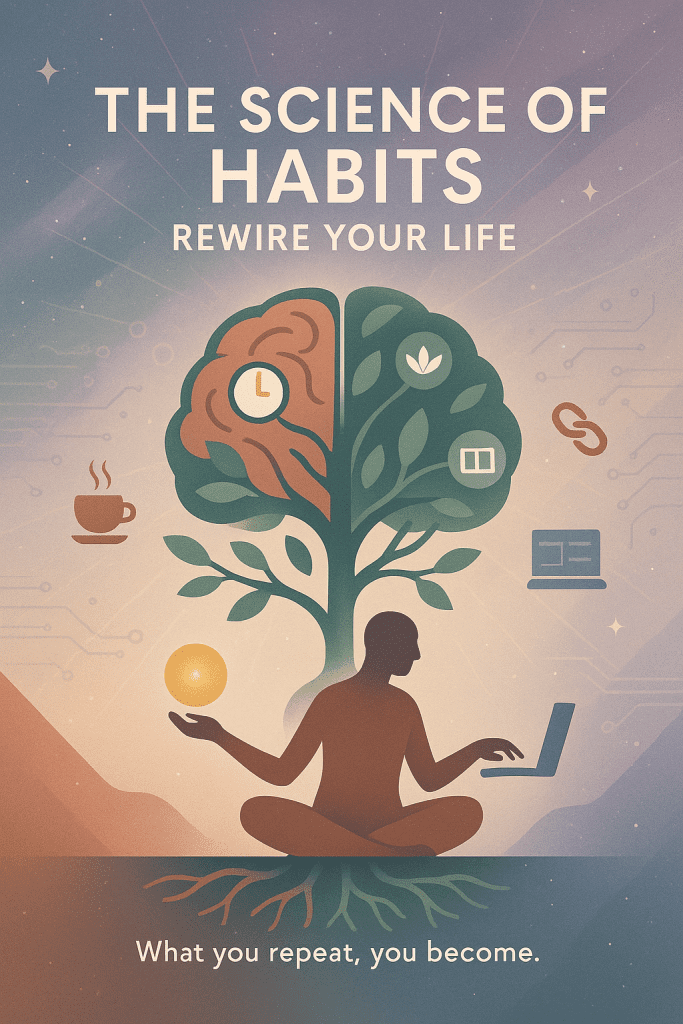“We are what we repeatedly do. Excellence, then, is not an act, but a habit.” — Aristotle’s words still ring true 2,300 years later. But let’s face it: building good habits (and breaking bad ones) can feel like trying to fold a fitted sheet—frustrating, confusing, and oddly existential. Fear not! This article blends neuroscience, spirituality, and a dash of wit to help you hack your habits like a pro.

The Habitual Brain: Your Mind’s Autopilot
Your brain is a lazy genius. To save energy, it automates repeated behaviors into habits via a three-step loop: Cue → Routine → Reward. Think of it like mental muscle memory. Every time you check Instagram mid-work (cue), scroll mindlessly (routine), and get a dopamine hit (reward), you’re etching that habit deeper into your neural pathways. Neuroscientists call this neuroplasticity—your brain’s ability to rewire itself. It’s like carving a hiking trail: the more you walk it, the clearer the path.
Famous Example: Benjamin Franklin famously tracked his 13 virtues (like temperance and humility) in a journal, turning self-improvement into a daily ritual. By aligning his habits with his values, he didn’t just build discipline—he built a legacy.
Cultivating Good Habits: Plant Seeds, Grow Forests
- Start Small, Think Cosmic
Tiny actions compound. Meditate for 2 minutes daily. Floss one tooth. As author James Clear notes, “Habits are the compound interest of self-improvement.”- Oprah Winfrey swears by morning gratitude journaling—a 5-minute habit that grounds her in purpose.
- Anchor New Habits to Existing Ones
Pair your new habit with a routine you already do. Coffee → 1-minute stretch. Post-dinner walk → phone-free reflection.- Stephen King writes 2,000 words daily before lunch, anchoring creativity to his circadian rhythm.
- Design Your Environment
Make cues obvious and frictionless. Want to read more? Leave books on your pillow.- Serena Williams lays out her workout gear the night before—a cue that’s harder to ignore than a snooze button.
Breaking Bad Habits: Weed Your Mental Garden
Bad habits are like invasive species—they thrive when unchecked. To uproot them:
- Interrupt the Cue-Reward Loop
Identify the emotional need driving the habit. Stressed and reaching for junk food? Swap chips for a brisk walk (same stress relief, better reward).- Steve Jobs replaced impulsive decisions with mindfulness—pausing to ask, “Is this truly necessary?”
- Reframe with Spirituality
Buddhist philosophy teaches that habits (samskaras) shape our karma. Breaking a habit isn’t just willpower; it’s aligning with your higher self.- Malala Yousafzai transformed fear into courage by framing her activism as a spiritual duty.
- Practice the “5-Second Rule”
When a craving hits, count backward from 5. This disrupts autopilot, giving your rational brain time to intervene. Thank Mel Robbins for that gem!
The Holistic Habit: Mind, Body, Spirit
Habits aren’t just about productivity—they’re rituals that connect us to something greater.
- Yoga merges breath and movement, turning exercise into meditation.
- Fasting, practiced by everyone from Gandhi to Beyoncé, resets both body and mind.
- Digital Detoxes (à la Elon Musk’s “no phone Sundays”) reclaim attention for creativity and connection.
Final Thought: Habits as Sacred Rituals
Your daily habits are whispers to your future self. Whether it’s Maya Angelou writing in a hotel room at dawn or Dalai Lama’s morning compassion meditations, intentional routines shape destinies. So, tend your habit garden with care. Plant seeds of purpose, pull the weeds of distraction, and remember: even the mightiest oak once lived as a stubborn acorn.
Ready to rewrite your story? The first step starts today—preferably before you check Instagram again. Grab a copy of James Clear’s “Atomic Habits” and get to scripting!
It’s Your Turn: Share a habit you’re cultivating (or breaking) in the comments! Let’s grow together. 🌱
— ThaPoetic1

